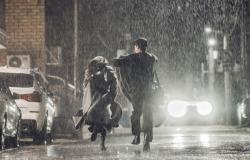When Richard Ford was in Oviedo to collect, in 2016, the Princess of Asturias Award for Literature, acknowledged in a press conference – held in the days before the ceremony – that he was a problematic teenager. His destiny was “jail or ending up in the army,” he said. Seeing him appear this Friday at the door of the Recoletos room, on the first floor of Madrid’s Hotel Wellington, our first feeling is that his life has taken exactly the opposite direction.
Dressed in a shiny striped jacket, his presence is impeccable and his broad smile cannot be spurious. He is an affable, talkative guy and seems delighted to sit right in front, on the other side of the long table that crosses the room, to talk about his visit to our country, in which he will take the opportunity to participate in the book Fair —This Saturday he appears with Mariana Enriquez at the colloquium Writing as resistancewhich will be held at the Cecilio Rodríguez Gardens Pavilion—and present his new novel, Be mine (Anagrama), the latest installment of the saga dedicated to Frank Bascombe.
The fifth book after the appearance of The sports journalistfrom 1986, begins with a brilliant dissertation about happiness, what it means in our lives, what its true relevance is. “Not worrying about being happy is giving life less than it deserves”, resolves before delving into the plot, which follows Bascombe, now a semi-retired real estate agent, and his son Paul, who is suffering from ALS. As reflective and existential as he usually is, he moves us with phrases like this: “I stay alive so that when my son leaves life behind he won’t feel alone.”
Ask. Can you say for sure that this will be the last installment of the Frank Bascombe series?
Answer. Yes. Just as I said the first was the first, this will be the last. Books don’t write to me, I write to them.
Q. Almost 40 years after the publication of The sports journalist, a novel in which he cast such a dark look on the human being of the time, how has Richard Ford changed? Do you look at humanity with more compassion?
R. The truth is I have never been a pessimist. A writer cannot be, because you are doing something that will be useful to others in the future. You are telling readers: pay attention to life, because life is important. I started writing The sports journalist shortly after my mother passed away. I may have been a little melancholic, and I sort of borrowed my own feelings and inserted them into Frank’s sense of loss about his child and his marriage.
Q. What has not changed in forty is the recipient of his dedication, Kristina.
R. I have dedicated my fourteen books to Kristina, yes. I always think that if a man is married, and he lives with his wife and loves her, who else is he going to dedicate it to if not her? To her editor, to her dog…? I knew people who had dedicated books to their students, but what the hell is that?
“If a man is married, and lives with his wife and loves her, to whom, if not her, would he dedicate his books? To his editor, to his dog…?
Q. What do you think would have become of Richard Ford if he had not been a writer?
R. Many things. He could have been another type of writer, surely a journalist. In reality, I would have loved to be a journalist, I would have been very happy, but no one gave me work.
Q. And what would have become of the writer Richard Ford without his great character, Frank Bascombe?
R. Ah, maybe it wouldn’t have been so good… But it wasn’t bad either. [risas].
[Richard Ford se despide del ‘periodista deportivo’ con otro crudo retrato de la sociedad norteamericana]
Q. I imagine that he doesn’t have the key to happiness, but is there a formula to avoid “lacerating unhappiness,” as Frank points out at one point in this novel?
R. No, I think not. The fact of being alive pushes you toward unhappiness, no matter what happens.. Surely the monks, even if they are in their sanctuary, also feel unhappy on more than one occasion, and that they basically dedicate their lives to good works, they stay away from the worldly noise, they do not get married (at least the good ones)… It is something that goes with life.
Q. What function does Valentine’s Day play in a novel about the love of parents and children and crossed by a terminal illness?
R. A friend of mine told me, when we were in a taxi, that I should write a book that takes place on Valentine’s Day. I thought it was a good idea. I titled it be mine (Be mine) because it is an expression that is printed on that type of jelly beans that, in my country, people give each other that day. I decided that that would be what Frank said to his son Paul, “Be my son,” as a last cry of affection. And it is also the expression with which Paul addresses Frank: “Be my father.”
“I would have loved to be a journalist, I would have been very happy, but no one gave me a job”
Q. The relationship they have is very exciting…
R. Yes, the truth is that when you decide that the plot is a relationship between father and son, you give yourself a very wide range of possibilities. I come from a family that always said I love you and I say it to my wife ten times a day.. And I say it with feeling, I really think about it every time I say it.
Q. The illness and death of loved ones permeate all of Frank Bascombe’s works. Why do these elements pair so well with his literature?
R. Until the moment I started writing The sports journalist, my custom had been to portray human beings who were in desperate situations. My wife asked me one day: Why don’t you write about someone happy? And I thought: but how do I do this? It seemed very foreign to me. Suddenly it occurred to me to create a character who had had a loss and was trying to overcome or regain happiness. Therefore, the formula that you describe was in the very essence of the character from the beginning.
Q. In The sports journalistFrank Bascombe had a vision of sport as a prosaic discipline…
R. Yeah.
Q. I don’t know if you know that the Madrid Book Fair now vindicates the increasingly close relationship between literature and sport.
R. Oh yeah? She didn’t know.
Q. Well, perhaps one of the reasons why he was invited is The sports journalist…
R. Ah, that’s fine with me, but I would have come too if they had invited me because I had blue eyes [risas].
“Sports are insignificant, they are simply games”
Q. What do you think, in any case, that books about sports can be important books?
R. In general, I don’t like books about sports. Only a small part of them cause me admiration. The problem is that sports are insignificant, they are simply games. People do them, and that’s all very well, but when you try to make them more important than they really are by giving them words, it often seems hollow.
Q. Can a story related to sports have the depth required of great literature?
R. Only if the writer is very smart and knows the limits of the sport. In that case, it seems to me that sport should be a backdrop and bring sincere and genuine emotions to the foreground. When they use sport as a metaphor for life, they are wrong. Sports are not a metaphor for life. In fact, life doesn’t need metaphorsyou have it right under your nose.
[Richard Ford: “Trump es una encarnación monstruosa de la indiferencia americana”]
Q. In 2016, when he was going to receive the Princess of Asturias Award in Oviedo, he was asked about the possibility of Trump winning the elections. You were sure he wouldn’t win…and he won. Now would you dare to venture it?
R. Clearly I was completely wrong. [risas]. Well now I can’t say it’s impossible for him to win, but I hope not.. I’m going to try to avoid it. With the age that I am, the truth is that my country is unrecognizable to me, it’s a mystery. I hear people say a lot of things, but I don’t know why they say it. I mean, you don’t want to vote for Biden, but that’s why you have to hate him? And the same if you want to vote for Trump: is that why you are going to buy all of his lies?
Q. And how are you going to try to stop him from winning?
R. Knocking on doors, talking to people, giving money… in every way you can be active in the campaign.
“Republicans have a very wrong conception of what government is for”
Q. In this novel there is also, through the reference to real estate, an allusion to gentrification. Do any of your country’s candidates intend to combat it?
R. Democrats want to build low-income public housing, with the goal of housing people who have been expelled. If there is a neighborhood that is gentrified and people have to leave because rents are going up too much, they will try to create and finance subsidized housing. Not the Republicans, they don’t care exactly, they think it’s great that rents go upthat old houses are transformed into Airbnb apartments, that insurance prices rise… They have a very wrong conception of what the government is for.
Q. Now that you’ve left Bascombe, are you working on another book?
R. Yes, I have a little novel taking shape. It starts from two personal experiences: on the one hand, I met a university dean, who is a rather comical figure; On the other hand, a friend of mine had a terrible illness and a doctor helped him die. I thought about how interesting it would be if a university professor got older, fell ill… and invited his friends over. And that one of the people he invites is the dean of his university. It seemed extremely comical to me. This is the starting point for this book, and I know it’s not exactly obvious. But My job is to make books that are not obvious. If I found the right title, it would be easier to move forward. I’m looking for it…





